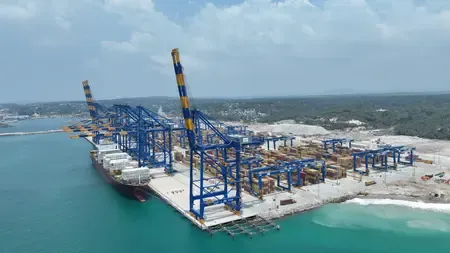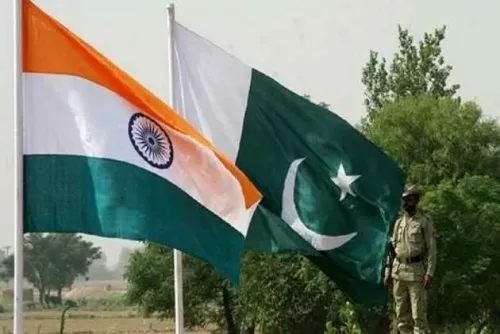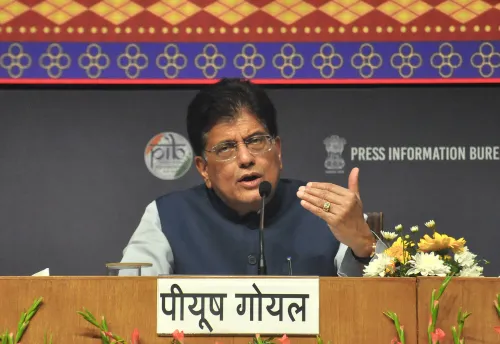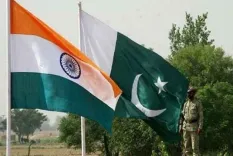How is Adani Ports Driving India's Blue Economy Aspirations at India Maritime Week 2025?

Synopsis
Key Takeaways
- APSEZ is a leader in India's port operations, showcasing how technology and innovation drive maritime growth.
- Inclusivity is a priority, with initiatives empowering women in maritime roles.
- Significant MoUs will enhance India's port capabilities and sustainability efforts.
- The Blue Economy is a growing sector, contributing substantially to India's GDP.
- APSEZ's commitment to green initiatives aligns with national goals of sustainability.
Mumbai, Oct 26 (NationPress) Adani Ports and Special Economic Zone Ltd (APSEZ), the foremost port developer and operator in India, is demonstrating the impact of technology, inclusivity, and indigenous innovation in propelling the nation’s path towards a self-sufficient and sustainable Blue Economy during India Maritime Week (IMW) 2025.
IMW 2025, set to occur at the Bombay Exhibition Centre in Mumbai from October 27-31, embodies India's maritime renaissance. This event, organized by the Indian Ports Association (IPA) under the Ministry of Ports, Shipping and Waterways, unites over 100,000 delegates, more than 500 exhibitors, 200+ international speakers, and participants from over 100 nations to outline the future of the global maritime economy.
At the center of this global congregation is Adani Ports and Special Economic Zone Ltd (APSEZ), highlighting its crucial contribution to the advancement of India’s maritime industry. The APSEZ pavilion showcases how technology, inclusivity, Make-in-India innovation, and sustainability are reshaping India’s maritime narrative. Prime Minister Narendra Modi is expected to attend on October 29, followed by the Global Maritime CEO Forum, further emphasizing India’s aspirations to dominate the maritime arena, as stated by the Adani Group.
Over the last decade, India’s maritime policy framework has rapidly progressed under the dual initiatives of Sagarmala and Maritime Vision 2030, incorporating over 150 projects across ports, shipping, and inland waterways. These flagship initiatives aim to position India as a global maritime hub by fostering port-led development, reducing logistics costs, and promoting sustainable coastal infrastructure—all crucial components of Aatmanirbhar Bharat.
Amidst this evolution, APSEZ, part of the diverse Adani Group, has become a cornerstone of India’s port-led expansion. From a single port at Mundra, Gujarat, in the late 1990s, APSEZ now operates 15 ports across India and four abroad, supported by 12 multimodal logistics parks, 132 rakes, and a fleet of over 5,000 vehicles. Handling nearly one-fourth of India’s total cargo, APSEZ today stands as the nation’s largest integrated transport utility.
During IMW 2025, the APSEZ Pavilion is structured around four essential pillars—Aatmanirbhar Bharat, Women Empowerment, AI-powered Logistics, and Impact. This year’s major emphasis is on the signing of MoUs aimed at enhancing India’s port, dredging, and harbor capabilities under the Make-in-India initiative.
In its Harbour Business, APSEZ will formalize several long-term MoUs to solidify its leadership in marine services. The ports leader will sign agreements with the Mumbai Port Authority for the supply and charter hire of six ASTDS tugs for seven years and one Green Tug (GTTP) for 15 years, along with an agreement with the VO Chidambaranar Port Authority in Tuticorin, Tamil Nadu, for the charter hire of two harbor tugs for seven years.
Additionally, APSEZ will sign agreements with the Chennai Port Authority for the charter hire of one 60 TBP Escort Tug Vessel and with the Directorate General of Shipping for the construction of 12 tugboats, set to be signed on October 29 in the presence of PM Modi.
In the dredging sector, APSEZ will formalize an MoU for the construction of a self-propelled grab dredger, marking another achievement in indigenous maritime engineering.
APSEZ will also establish MoUs for new strategic developments at Vadhvan Port, Haldia Port, Vizhinjam LNG bunkering, and Dighi Port, demonstrating its commitment to capacity enhancement and green infrastructure.
A significant highlight of APSEZ’s presentation is India’s inaugural Tailing Suction Hopper Dredger (TSHD) simulator, designed by ARI Simulation for APSEZ under the Make-in-India program—a landmark that underscores India’s engineering capabilities and supports Sagarmala’s mission to expand port capacity through domestic production.
Inclusivity is a cornerstone of the APSEZ narrative. At Vizhinjam Port in Kerala, India’s first transshipment hub, APSEZ has successfully trained and deployed the nation’s first women quay crane operators, showcasing how technology and skill development can foster equitable opportunities in maritime operations.
Its Zero Touch Multi-Modal Logistics Platform integrates ports, rail, road, and inland waterways utilizing AI-driven predictive analytics, directly contributing to reduced logistics costs and enhanced efficiency—essential for boosting India’s trade competitiveness.
Through Adani Skills & Education (ASE), APSEZ has trained over 8,000 youths in ports and logistics within just two years, achieving 100 percent employment. Its flagship Karma Shiksha program—India’s first NCVET-accredited diploma in Ports & Logistics—blends classroom instruction with practical experience. Across the APSEZ network, 53,000 individuals have undergone safety training, and 7,000 youth and women have received training at Adani Krishnapatnam Port in Andhra Pradesh alone.
India’s Blue Economy, contributing approximately 4 percent to GDP ($13.2 billion), is rapidly evolving into a growth frontier encompassing fisheries, renewables, coastal tourism, and logistics. With 100 percent FDI permitted in port infrastructure and green initiatives such as the Green Tug Transition Programme (GTTP) and Harit Sagar Guidelines, sustainability and self-reliance are converging. APSEZ complements these national objectives through renewable energy adoption, electrified cranes, wastewater recycling, and carbon-neutral terminals.
With a global presence spanning Haifa (Israel), Colombo (Sri Lanka), Queensland (Australia), and Dar es Salaam (Tanzania), APSEZ bolsters India’s SAGAR Vision (Security and Growth for All in the Region), enhancing regional collaboration and trade resilience.
“As India navigates the Decade of the Seas, APSEZ’s leadership—rooted in Make-in-India innovation, digital transformation, and inclusive growth—embodies the nation’s maritime ambition: self-reliant, sustainable, and poised to lead the Global South,” the statement concluded.









